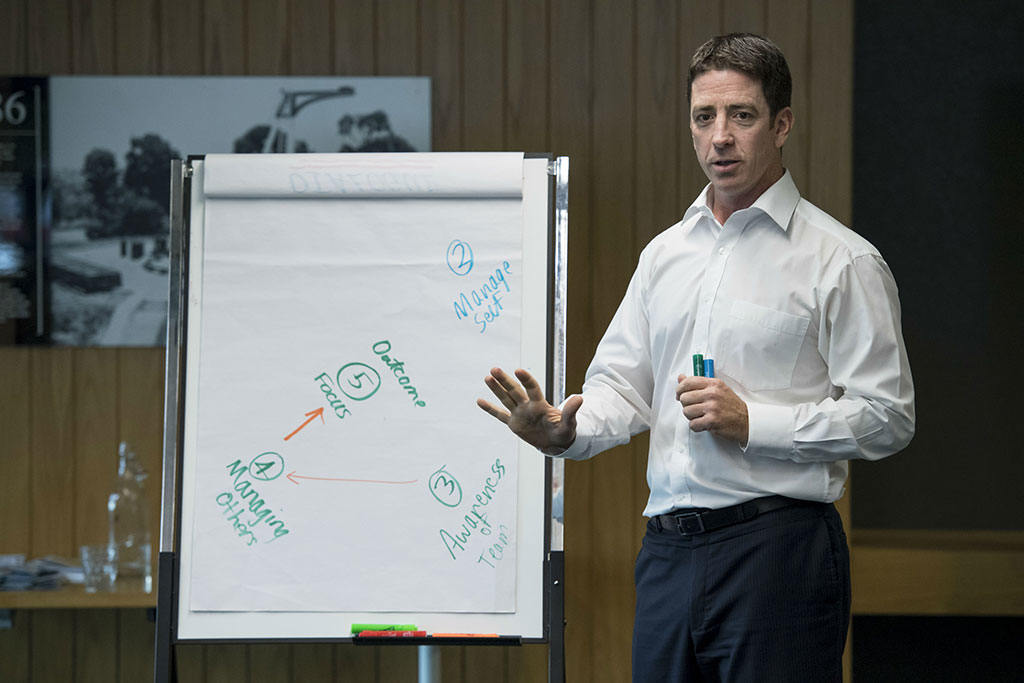Why Having Unusual Conversations Is Good For Business

Workplace conversations usually involve a lot of instructions, demands, closed questions (“do you agree?”) and leading questions (“this will be good, won’t it?”). They often feature idle chitchat about nothing, collusion, lies, gossip or worse. They may not be pleasant, but these are automatic and socially acceptable ways to relate to others.
These types of conversations are dominated by whoever is the most senior person. The senior person gets their way by telling others what to do. Telling people what to do is a valid management skill. It can be helpful for driving short-term behavioural change – but it’s not leadership.
Leadership is about fostering ideas, energy and a willingness to collaborate to inspire possibilities or to solve problems together so everyone learns. Leaders intent on creating this type of culture use unusual conversations. They use the coaching approach.
The coaching approach
The coaching approach is characterised by open questions, curiosity, listening and a focus on drawing out the full potential of an individual or team. It involves respectful challenge, it builds trust and focuses on creating new possibilities. It improves results by building personal accountability and creating a motivated workforce. So why are these conversations not used more often?
The effect of conditioning
Children learn how to relate to others through the experiences they had growing up. For example, have you ever yelled a message to a loved one from a different room? If you have, you probably experienced it yourself a thousand times before you were seven. By then, it had become perfectly normal.
Childhood conditions us to function within the acceptable norms of the family, school and society we grew up in. Once conditioned, we are equipped to leave home and find our place in the community, find a job, somewhere to live and a relationship. We then repeat this process with our own children.
Adult development researchers Kegan and Lahey refer to this stage of consciousness as Socialised. They suggest that 70 per cent of the adult population operate out of the socialised stage of consciousness.
By observing society’s conventions we maintain our laws, bureaucracies, religions and the culture of our family, country and workplace. Curiously, these normal dynamics are maintained by mostly fear-driven thought processes.

Straying from the herd
Fear plays a powerful role in nature. Mammals gather in groups and must follow the rules of the group to survive. Individuals that stray from the conventions of the herd risk being an easy meal for predators. It’s extremely effective and, since the Ice Age, has allowed humans to profit and grow into the species we are today.
Next time you have a conversation, notice whether it’s a usual conversation. Chances are, you will be talking to each other and not really listening, and the person with senior status will dominate the conversation while the other concedes. This is a fear-driven dynamic.
Kegan and Lahey’s research has also shown us that 30 per cent of people demonstrate thinking and behaviour beyond the Socialised stage. These adults incorporate the merits of the Socialised stage with other strengths to make new thinking and advancement possible. They call this new stage Self Authoring. Progress and new ideas come from those who operate from the Self Authoring stage of consciousness.
Have you read?
World’s Best Countries To Invest In Or Do Business For 2018
RANKED: The World’s Top 10 Richest Countries (2017-2027)
Revealed: Top Rated Visitor Attractions In Every Country In The World
The World’s Safest Cities Ranking, 2018
Overcoming change resistance
Operating from the Self Authoring stage is tricky because new ideas are always resisted by the Socialised group – and rightly so. If we followed every wacky idea, there would be chaos. The Socialised group tests new ideas so they can be improved until accepted or dismissed by the group.
Famously, Galileo was imprisoned because he suggested the earth was not the centre of the universe. Society at that time was not able to accept his new thinking.
This happens in workplaces every day. Managers who try to drive change by telling people what to do fail. To achieve meaningful change, leaders need to be strategic, have a plan, and make it important to employees. They must communicate it in a way that respects employees’ intelligence, and embraces feedback and criticism.
None of us is as smart as all of us, and leaders who use the unusual conversation, – or the coaching approach – will see success follow.
Add CEOWORLD magazine to your Google News feed.
Follow CEOWORLD magazine headlines on: Google News, LinkedIn, Twitter, and Facebook.
This report/news/ranking/statistics has been prepared only for general guidance on matters of interest and does not constitute professional advice. You should not act upon the information contained in this publication without obtaining specific professional advice. No representation or warranty (express or implied) is given as to the accuracy or completeness of the information contained in this publication, and, to the extent permitted by law, CEOWORLD magazine does not accept or assume any liability, responsibility or duty of care for any consequences of you or anyone else acting, or refraining to act, in reliance on the information contained in this publication or for any decision based on it.
Copyright 2024 The CEOWORLD magazine. All rights reserved. This material (and any extract from it) must not be copied, redistributed or placed on any website, without CEOWORLD magazine' prior written consent. For media queries, please contact: info@ceoworld.biz
SUBSCRIBE NEWSLETTER








